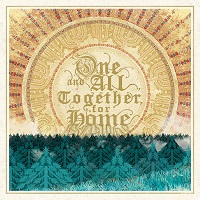Though it might mainly appeal to the folk-metal audience, this is one of those rare occasions when it’s downright legit to say this is an album not to miss out on. One and All, Together, for Home is a double-disc compilation of seventeen never before released tracks by eight various artists from around the world that have brought together folksongs from their distant homelands. With multihued creativity, the collection includes renditions of ancient folksongs, recreated folktales, and original work from topnotch folk-metal bands.
What (or who) do we have here? It’s a new version of the old British ballad of “John Barleycorn!” Of course none other but the UK’s Winterfylleth would be the next group to make their own version of “John Barleycorn,” and with the perfect amount of folk musicality matched with a grimly way of reciting the misfortunate tale. Then Winterfylleth take us down an even darker passage with “Abbots Bromley Horn Dance,” one of those classic sorrowful violin pieces where notes pour from the strings like weeping tears, graceful and passionate with a sense of sadness that can easily be listened to over and over without losing its emotive potency.
Both Mondvolland of The Netherlands and Häive of Finland stuck loyal to their metal sides, and by doing so made significant contributions in relation to metal. From Mondvolland is the blackened metal/folk song “Montferland III,” plus parts I-II, all three dark and invigorating in their own ways, metal or not. Häive also puts out three tracks. One of their masterworks is “Ei Kuule Emo Minua,” a song that could easily be the favorite of anyone into melodic black metal.
It must be noted how amazing AA Nemtheanga’s vocals sound in both songs by Ireland’s Primordial. You can really hear his voice, not just his vocals, which is remarkable because there is a big difference between voice and vocals. In their epic deliverance of “Dark Horse on the Wind,” when he says “I have rattled dead men’s bones,” you might believe him just because he sings so impassioned with the mysterious and lofty spirit of a pirate, why not take his word for it? Next, we continue the ride with Primordial through a Celtic adventure in “The Foggy Dew,” a popular Irish ballad/lament that nobody can beat Primordial’s version of.
Himinbjorg’s “Esprit de Brave” is their one and only song here, but it stands out with an astounding blend of bagpipes, flutes, and raspy vocals. They basically took some very traditional instruments and aligned them with metal-type vocals, and it’s awesome. What’s more, the dancing rhythmic flow of “Esprit de Brave” can sweep you off your feet, especially if you’ve ever participated in folk dance.
It’s not so much of a surprise that Drudkh’s song titles somehow got switched in the first pressing. Otherwise, the song that was originally marked as “Forgotten Lullaby” but is actually “Dovbush” would be a rather unnerving lullaby. “Dovbush” begins with a foray of hurtling drum strikes, each beat growing louder and charging forth like a large boulder on the loose. And following an exotically played acoustic guitar tune, a serpentine melody of a flute enters the scene, and thus, the all-instrumental serenade is commenced. Chances are you wouldn’t sleep to that even if someone did tell you it was a lullaby, it’s much too exhilarating.
The bands and songs discussed above are a selected clump among the many marvelous works on this album. Some bands may have more or less titles than others, but all are equally important to the collection. This project is one of the best ideas Drudkh’s own Roman Sayenko has ever had, and the product of that idea will always be one of the most brilliant highlights in the everlasting history of folk-metal. Even in modern music, the roots of musical culture can never be forgotten, but only embraced, relived, renewed, and immortalized. One and All, Together, for Home reflects how powerfully music can unify diverse cultures and homely heritages. After all, music is the universal language.


